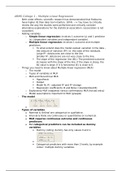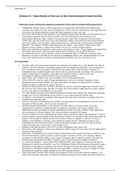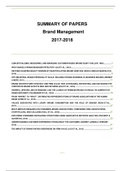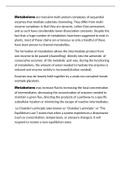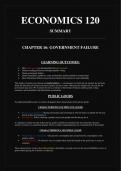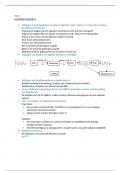Cells: the living units
Cell theory
A cell is the structural and functional unit of life
How well the entire organism functions depends on individual and
combined activities of all of its cells
Structure and function are complementary
Biochemical functions of cells are dictated by shape of cell and specific
subcellular structures
Cell diversity
Over 200 different types of human cells
Types differ in size, shape, and subcellular components; these differences
lead to differences in functions
Generalized cell
All cells have some common structures and functions
Human cells have three basic parts:
Plasma membrane: flexible outer boundary
Cytoplasm: intracellular fluid containing organelles
Nucleus: DNA containing control center
The plasma membrane
Functions:
Acts as an active barrier separating ___________intracellular fluid
(ICF)______________ from ____________extracellular fluid
(ECF)_____________
Is the “contact” surface so it provides:
a) cell adhesion- to either other cells or a surface
b) cell identity markers
c)receptors- for various chemicals
Plays dynamic role in cellular activity by controlling what enters and what
leaves cell
Has enzyme systems so it is the site of many chemical reactions
Also known as the “cell membrane”
Structure:
, Consists of ____________membrane lipids_____________ that form a
flexible ___________lipid bilayer______________
Specialized ____________membrane proteins_____________ float
through this fluid membrane, resulting in constantly changing patterns
Known as the “fluid mosaic model” because it is not rigid, rather it is a semi-
fluid bi-layer of phospholipids arranged and held together by their
relationship with water (polar heads on surface, non polar tails inside)
Membrane proteins:
Allow cell communication with environment
Make up about half the mass of plasma membrane
Most have specialized membrane functions
Some float freely, and some are tethered to intracellular structures
Two types:
Integral proteins
peripheral proteins
Integral proteins
Firmly inserted into membrane
Most are transmembrane proteins (span membrane)
Have both hydrophobic and hydrophilic regions
Hydrophobic areas interact with lipid tails
Hydrophilic areas interact with water
Function as:
Transport proteins (channels and carriers)
Enzymes
Receptors
Peripheral proteins
Loosely attached to integral proteins
Include filaments on intracellular surface used for plasma membrane
support
Function as:
Enzymes
Motor proteins for shape change during cell division and muscle
contraction
Cell-to-cell connections
Part of _____________glycocalyx____________, serving as identification
markers for cell recognition
Receptors for recognizing molecules


